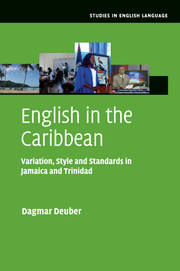24 results
Susanne Mühleisen, Genre in World Englishes: Case studies from the Caribbean (Varieties of English Around the World, G67). Amsterdam and Philadelphia: John Benjamins, 2022. Pp. viii + 229. ISBN 9789027211385.
-
- Journal:
- English Language & Linguistics , First View
- Published online by Cambridge University Press:
- 06 March 2024, pp. 1-5
-
- Article
- Export citation
David Jowitt, Nigerian English (Dialects of English 18). Berlin: De Gruyter Mouton, 2019. Pp. x + 242. ISBN 9781501512728.
-
- Journal:
- English Language & Linguistics / Volume 25 / Issue 3 / September 2021
- Published online by Cambridge University Press:
- 09 December 2020, pp. 671-675
-
- Article
- Export citation
13 - Standard English in Trinidad: Multinormativity, Translocality, and Implications for the Dynamic Model and the EIF Model
-
-
- Book:
- Modelling World Englishes
- Published by:
- Edinburgh University Press
- Published online:
- 24 September 2020
- Print publication:
- 31 March 2020, pp 274-297
-
- Chapter
- Export citation
7 - The modal verbscan/couldandwill/wouldin Caribbean and other varieties of English
-
- Book:
- English in the Caribbean
- Published online:
- 05 April 2014
- Print publication:
- 03 April 2014, pp 202-237
-
- Chapter
- Export citation
Figures
-
- Book:
- English in the Caribbean
- Published online:
- 05 April 2014
- Print publication:
- 03 April 2014, pp x-xi
-
- Chapter
- Export citation
Tables
-
- Book:
- English in the Caribbean
- Published online:
- 05 April 2014
- Print publication:
- 03 April 2014, pp xii-xiii
-
- Chapter
- Export citation
4 - Data and methodology
-
- Book:
- English in the Caribbean
- Published online:
- 05 April 2014
- Print publication:
- 03 April 2014, pp 67-78
-
- Chapter
- Export citation
6 - Style and standard in Trinidadian English: analysis of four text categories
-
- Book:
- English in the Caribbean
- Published online:
- 05 April 2014
- Print publication:
- 03 April 2014, pp 138-201
-
- Chapter
- Export citation
5 - Style in Jamaican English: analysis of conversations
-
- Book:
- English in the Caribbean
- Published online:
- 05 April 2014
- Print publication:
- 03 April 2014, pp 79-137
-
- Chapter
- Export citation
8 - Conclusion
-
- Book:
- English in the Caribbean
- Published online:
- 05 April 2014
- Print publication:
- 03 April 2014, pp 238-254
-
- Chapter
- Export citation
Appendix A - Markup symbols
-
- Book:
- English in the Caribbean
- Published online:
- 05 April 2014
- Print publication:
- 03 April 2014, pp 255-255
-
- Chapter
- Export citation
Acknowledgements
-
- Book:
- English in the Caribbean
- Published online:
- 05 April 2014
- Print publication:
- 03 April 2014, pp xiv-xvi
-
- Chapter
- Export citation
2 - The background and context of English in Jamaica and Trinidad
-
- Book:
- English in the Caribbean
- Published online:
- 05 April 2014
- Print publication:
- 03 April 2014, pp 22-43
-
- Chapter
- Export citation
English in the Caribbean - Title page
-
-
- Book:
- English in the Caribbean
- Published online:
- 05 April 2014
- Print publication:
- 03 April 2014, pp v-v
-
- Chapter
- Export citation
English in the Caribbean - Half title page
-
- Book:
- English in the Caribbean
- Published online:
- 05 April 2014
- Print publication:
- 03 April 2014, pp i-i
-
- Chapter
- Export citation
1 - Introduction
-
- Book:
- English in the Caribbean
- Published online:
- 05 April 2014
- Print publication:
- 03 April 2014, pp 1-21
-
- Chapter
- Export citation

English in the Caribbean
- Variation, Style and Standards in Jamaica and Trinidad
-
- Published online:
- 05 April 2014
- Print publication:
- 03 April 2014
Appendix B - Biodata form1
-
- Book:
- English in the Caribbean
- Published online:
- 05 April 2014
- Print publication:
- 03 April 2014, pp 256-257
-
- Chapter
- Export citation
3 - The sociolinguistics of style and the Creole continuum
-
- Book:
- English in the Caribbean
- Published online:
- 05 April 2014
- Print publication:
- 03 April 2014, pp 44-66
-
- Chapter
- Export citation
References
-
- Book:
- English in the Caribbean
- Published online:
- 05 April 2014
- Print publication:
- 03 April 2014, pp 258-276
-
- Chapter
- Export citation



